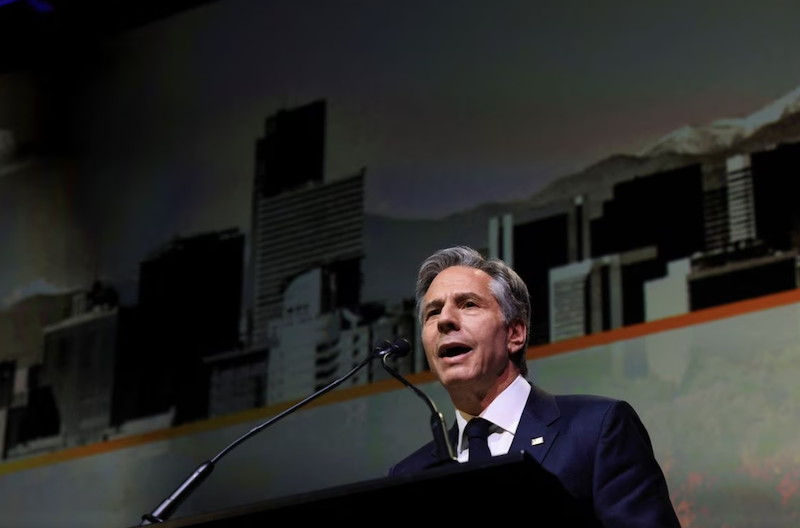China’s foreign ministry on Wednesday declined to share any information on reports of US Secretary of State Antony Blinken planning to travel to China in the coming weeks.
A US official, on condition of anonymity, said on Wednesday that Washington’s top diplomat was planning to visit China, with multiple US news media reporting the same. While the official did not elaborate on timing, a Financial Times report said Blinken’s visit was scheduled within this month.
“I have nothing to share on that,” Chinese foreign ministry spokesperson Wang Wenbin said, responding to the reports at a regular press briefing.
Also on AF: Foreign CEOs in China Keep ‘Heads Down’ to Manage Tricky Ties
Blinken’s trip to China is intended by Washington to be a major step toward what President Joe Biden has called a “thaw” in relations between the world’s two largest economies.
Tensions between the US and China have continued to escalate since the Chinese spy balloon saga which prompted Blinken to scrap a planned trip to Beijing in February.
Washington’s steps to curb exports of chips and advanced chipmaking tools to China and Beijing’s recent tit-for-tat ban on US chipmaker Micron continue to be a thorn in relations between the two.
Also pressing on their ties are issues including military activity in the South China Sea, Beijing’s human rights record and democratically governed Taiwan – which China claims as its own territory.
US ‘working hard’ to manage China
The State Department’s top official for East Asia, Daniel Kritenbrink, was in Beijing this week for talks with Chinese counterparts, a visit seen as a step toward a possible Blinken trip.
The two sides had “candid, constructive and fruitful” talks, and agreed to maintain communication lines, US and Chinese officials said.
Asked by reporters in Beijing if Blinken would visit soon, Kritenbrink said: “We’ll see.” The United States was “working hard” to manage the relationship with China, he said.
Looming over the meeting was what US called an “unsafe interaction” between a Chinese warship and a US destroyer in the sensitive Taiwan Strait. The US military said the Chinese ship cut in front of the US vessel, coming within 150 yards.
US Indo-Pacific coordinator Kurt Campbell said the incident showed the need for keeping lines of communication open “to prevent circumstances where unintended consequences can have terrible consequences.”
“China is increasingly a great power. Her (military) forces rub up against our’s much more than they did in the past. The potential for miscalculation, inadvertence, is real and growing,” Campbell said.
China says responsibility on US
The spokesperson for China’s embassy in Washington Liu Pengyu said China was “open to have dialogues with the US side.”
Beijing “hopes that the US will meet China halfway and jointly implement the important consensus reached by the two presidents at the Bali Summit,” Liu said, referring to the last meeting between Biden and Chinese President Xi Jinping in Indonesia in November.
Meanwhile, at the press briefing on Wednesday, foreign ministry spokesperson Wang said China and the US were maintaining “necessary communication” but also lashed out against Washington.
The US should “stop calling for communication on the one hand and making provocations on the other,” he said.
“The responsibility for the current challenges facing China-US relations does not lie with China. The US needs to respect China’s core interests and major concerns, stop interfering in China’s internal affairs, stop harming China’s interests.”
- Vishakha Saxena, with Reuters
Also read:
US to Target Investment in China Chips, AI, Quantum Computing
World Big Enough for China And US, Says Beijing’s Defence Chief
Biden Urged to Hit Back at China Over Micron Ban, Rally Allies
‘De-China’ Move: Tech Owners Keen to Leave, Avoid US Rivalry
China Raids Office of US Due Diligence Firm, Detains Staff
US Risks ‘Enormous Damage’ With China Chip War: Nvidia CEO
























